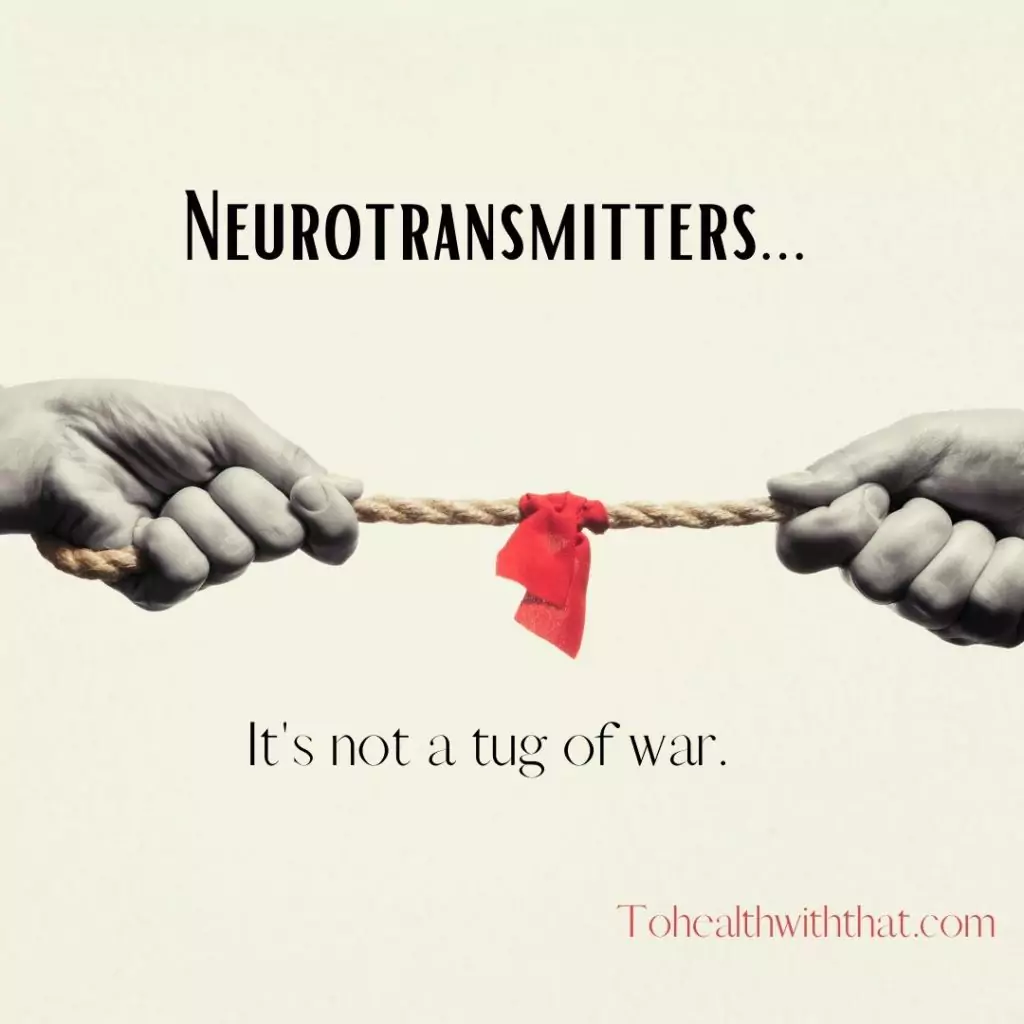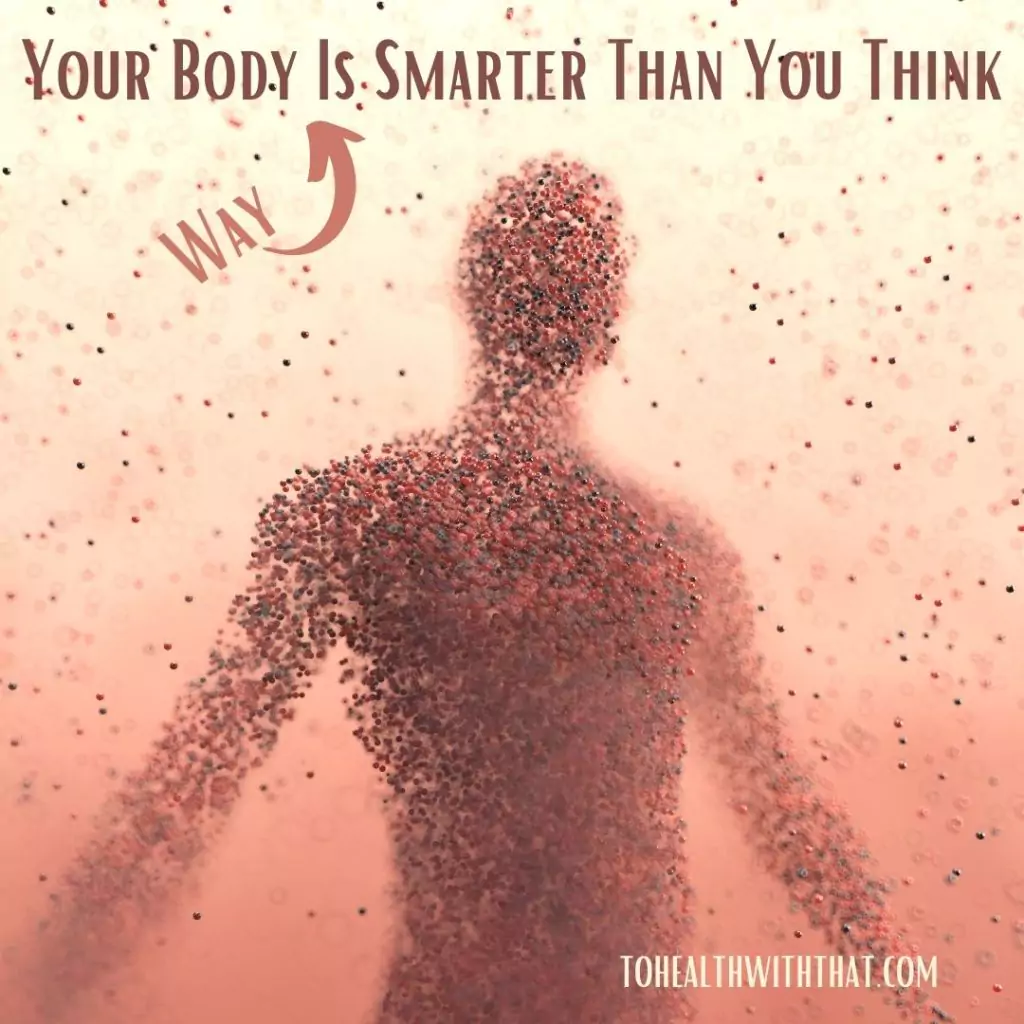These past few weeks we’ve been talking about the link between MTHFR and the production of different neurotransmitters via the BH4 pathway. This includes serotonin and melatonin, dopamine, and norepinephrine and epinephrine.
The research seems to mostly agree that people with mental health issues like depression or anxiety, often have imbalanced neurotransmitters. Somehow, however, that has translated into a locked-in, fixed idea pattern culturally in which depression and anxiety are always neurotransmitter issues and so supplementing or augmenting neurotransmitters is the best path forward medically.
Everyone Agrees Mental Health Is All About Neurotransmitters.
I do want to say that there are people who find a supplement or drug that works for them, stay on the same dose for 15 years, and feel great. There are those cases. These are the shining examples of neurotransmitter-based therapies working and I love seeing them because in the end, it’s a simple solution.
Unfortunately, there are also cases of people chasing down a feeling they had briefly. They get on a drug or supplement, go through the adjustment reactions, it works for six months or a year and then they’re back where they startedmentally, but taking a pill. They increase the dose, increase again, switch to a related drug or supplement and still aren’t where they want to be. They can’t match that time period when the pill was working. They switch to a different class or category of drugs or supplements, and give that a try. Each time with a six to eight-week adjustment window and a host of new or different side effects. I see this all too frequently.
There are several possible problems with the neurotransmitter-only model. We’ll start with the simplest and most obvious problem and work toward more controversial issues.
“Depression” Is a Big Word
And it seems to mean something a little bit different to everyone who says it. Likewise, with anxiety. Over the years I’ve had hundreds of clients tell me they’re depressed. They are always surprised when I ask what that means to them. Not surprisingly, the answer to that question varies greatly.
One man was highly offended at having to educate me about such a basic question. His answer was, “What do you mean what do I mean? I’m depressed! I get up in the morning, the toaster doesn’t work so I slam it on the counter four or five times, and then run out of the door without eating because it’s just too difficult. I’m depressed.” Another client told me she got up in the morning, cried in the shower, cried in the car, smiled all day through her work as a high-level executive, cried the whole way home, then smiled through dinner with her family.
You might notice that the pictures these two people have painted are very different. And these are just two examples out of a seemingly endless variety. The point is, “depression” isn’t something uniform. Sadly, when many people go to their doctor or practitioner and say “I’m depressed” there are only really a handful of standard neurotransmitter-based treatment options for such a myriad of different pictures.

Neurotransmitter Overlap
Another issue I see with the idea of working with mental health from a purely neurotransmitter direction is that the neurotransmitters have significant overlap.
Say you look at something like attention. Serotonin, dopamine, norepinephrine and epinephrine are all heavily involved in attention. Much the same with enjoyment and even alertness. In situations like this engaging in lifestyle changes to actually boost all of these neurotransmitters is a great idea and will help to cover all the bases, but taking a drug or supplement that boosts one pathway leaves plenty of gaps in the system.
It’s obvious, when you look at it this way, that boosting one pathway out of many might lead to imbalances elsewhere that show up as side effects.
It Is Not A Tug Of War
Medicine has become very mechanistic since the advent of penicillin because so many drugs, which do one precise thing in the body, have been lifesaving. I’m all for lifesaving drugs, but this model comes at a cost. We’ve backed ourselves into a corner in which we tend to oversimplify the body into being akin to a constant tug of war between opposing forces or directions of imbalance.
If we suspect serotonin is low – meaning the low side of the tug of war is winning – then we just boost up the other side so it gets higher. Easy. The problem is, neurotransmitters are less like a tug of war and more like a web, with forces pulling at twelve points instead of two. We can, of course, boost up one of those points but it becomes difficult to predict how the other twelve will react and where that will place new stressors on the body.

Your Body Is Smarter Than That
The last issue with boosting a particular neurotransmitter chemically is that for very many people this turns into chasing a dream. Think back to the scenario in the outline where someone started neurotransmitter therapy, had a golden year or nine months, then chased that for the next three years. What happened there?
Well, it is my belief, although this is not a well-researched area, that your body is pretty smart at adapting to the outside world. If your body has set your neurotransmitters at a certain level, and you do something to change that level, I have every faith that your body can reset so that they’re at that same level again, even with the new influence.
The point is, that we’re not getting to the WHY question. WHY did your body set the neurotransmitters at that level to begin with?
Maybe it really is a disfunction or pathology in which your body can’t keep up with production. That is a legitimate possibility (and MTHFR folks – if your methylation isn’t balanced then this is entirely possible because your BH4 pathway is impaired). But what if the problem isn’t production? What if there is a more complex reason for the neurotransmitters being set where they are? What if they are there to compensate for something else that is out of balance?
Your body is the most amazing thing you will ever see, touch, or possess. It is working constantly to return to health, to compensate for damage, to adapt to a dynamic world full of challenges and resources of which you aren’t consciously aware.

So If It Is Not All About Neurotransmitters, Then How Do We Fix It?
The wonderful thing is that working with neurotransmitters is still an option, but this opens up a lot of other options as well. Before you look to neurotransmitters it is important to look to other causes of mental health issues. We did a whole post previously on this topic but some of the more common ones are:
- Low folate
- High homocysteine
- Low thyroid
- Imbalanced hormones
- Low testosterone
- Estrogen dominance
- Trauma or mental health history
Nobody likes that list because it’s just easier if there’s a pill for it. Sometimes the pills really are the best thing, but it’s a good idea to be open to other types of treatment as well. Be willing to let go of the idea of the magic pill if it just isn’t serving you.
MTHFR is a common genetic mutation that can contribute to anxiety, depression, fatigue, chronic pain, infertility, and more serious conditions like breast implant illness, heart attack, stroke, chronic fatigue syndrome, and some types of cancer. If you know or suspect you have an MTHFR variant, schedule a free 15-minute meet-and-greet appointment with MTHFR expert Dr. Amy today.
Book Your Appointment

